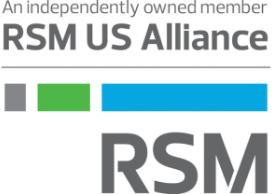
GreerWalker is a proud member of RSM US Alliance, a premier affiliation of independent accounting and consulting firms in the United States. RSM US Alliance provides our firm with access to resources of RSM US LLP, the leading provider of audit, tax and consulting services focused on the middle market. RSM US LLP is a licensed CPA firm and the U.S. member of RSM International, a global network of independent audit, tax and consulting firms with more than 43,000 people in over 120 countries. Our membership in RSM US Alliance has elevated our capabilities in the marketplace, helping to differentiate our firm from the competition while allowing us to maintain our independence and entrepreneurial culture. We have access to a valuable peer network of like-sized firms as well as a broad range of tools, expertise, and technical resources. For more information on how GreerWalker can assist you, please call (704) 377-0239.
This article was originally published on November 15, 2018
Major federal tax reform enacted in 2017 resulted in the opportunity for tax savings tied to investment in marginalized areas in the form of qualified opportunity zones (QOZ). In addition to the benefits laid out in the government’s opportunity zone regulations, companies may be able to realize additional savings through state tax credits and other incentive programs. QOZs encourage investment in qualifying areas designated by governors in every state. Generally, these tracts are distressed, or present other obstacles to economic growth. There is a high correlation between QOZs and those areas eligible for various other state, local, and federal credits and incentives.
By investing in certain opportunity funds, taxpayers can defer and even reduce their state and local tax liability. And with proper due diligence, a company may be able to leverage other state, local or federal credits and incentives available to QOZ projects. A project or business receiving an opportunity zone fund investment is not precluded from seeking other credits or incentives. In fact, state and local economic development agencies may be more likely to direct public dollars toward QOZ projects or businesses in the form of income tax incentives, hiring incentives, non-tax incentives or property tax reductions.
In this article, we will discuss some of the state, local and federal tax credits and incentives that businesses should consider for projects in QOZs. By utilizing these programs, companies may be able to immediately receive cash or other benefits associated with their investment.
- New markets tax credits (NMTC). Similar to QOZs, the NMTC program offers incentives for investment in distressed areas. Frequently, areas that qualify for QOZ credits also qualify for NMTC. The NMTC offers third-party interest-only forgivable loans to projects in severely distressed census tracts across the United States. This incentive is designed to encourage investments that create significant community benefits such as job creation, access to healthy foods or medical care. The NMTC loan is added to the capital stack, reducing a project’s overall investment needs. After seven years, the loan to the project is forgiven, resulting in a significant back-end benefit to a project. Funds can be used for real estate and construction, machinery and equipment, and even operating costs. It is available to both for-profit and not-for-profit businesses.
- Tax increment financing (TIF). Municipalities use TIF to incentivize property development in distressed areas – areas that frequently overlap with QOZs. TIF allows municipalities to pledge a portion of the property tax increment that results from project investment to reimburse the project developer for certain eligible project costs. The combination of TIFs and QOZs may be particularly attractive to REITs and real estate developers who are looking to reduce project development costs.
- State job and investment credits. State job credits incentivize companies that create or retain jobs. State Investment credits incentivize capital investment. States frequently offer enhancements to these credits for projects in distressed areas – again, often overlapping with QOZs. Businesses with significant planned investment or job creation may be interested in these credits.
- Work opportunity tax credit (WOTC). WOTC is a federal job-creation credit designed to incentivize businesses that hire disadvantaged employees. For-profit companies that frequently hire from lower-income or other disadvantaged groups may benefit from using WOTC for QOZ projects to further improve a project’s return on investment.
- In-kind contributions. States and municipalities can contribute land or infrastructure improvements to projects in order to encourage project development. Typically these contributions are more likely to occur in QOZ areas. These in-kind contributions can benefit a wide range of clients and can result in improved project viability.
Opportunity zones are an important addition to the economic development toolbox, but they should not be viewed in a vacuum. Other state and local incentives can increase the total benefits to opportunity zone projects, increasing project feasibility and improving return on investment.
Let’s Talk!
Call us at (704) 377-0239 or fill out the form below and we’ll contact you to discuss your specific situation.
This article was written by Rob Calafell and originally appeared on 2021-09-21.
2022 RSM US LLP. All rights reserved.
https://rsmus.com/insights/services/business-tax/opportunity-zone-investors-should-consider-state-and-local-tax-c.html
The information contained herein is general in nature and based on authorities that are subject to change. RSM US LLP guarantees neither the accuracy nor completeness of any information and is not responsible for any errors or omissions, or for results obtained by others as a result of reliance upon such information. RSM US LLP assumes no obligation to inform the reader of any changes in tax laws or other factors that could affect information contained herein. This publication does not, and is not intended to, provide legal, tax or accounting advice, and readers should consult their tax advisors concerning the application of tax laws to their particular situations. This analysis is not tax advice and is not intended or written to be used, and cannot be used, for purposes of avoiding tax penalties that may be imposed on any taxpayer.
RSM US Alliance provides its members with access to resources of RSM US LLP. RSM US Alliance member firms are separate and independent businesses and legal entities that are responsible for their own acts and omissions, and each are separate and independent from RSM US LLP. RSM US LLP is the U.S. member firm of RSM International, a global network of independent audit, tax, and consulting firms. Members of RSM US Alliance have access to RSM International resources through RSM US LLP but are not member firms of RSM International. Visit rsmus.com/aboutus for more information regarding RSM US LLP and RSM International. The RSM(tm) brandmark is used under license by RSM US LLP. RSM US Alliance products and services are proprietary to RSM US LLP.

GreerWalker is a proud member of RSM US Alliance, a premier affiliation of independent accounting and consulting firms in the United States. RSM US Alliance provides our firm with access to resources of RSM US LLP, the leading provider of audit, tax and consulting services focused on the middle market. RSM US LLP is a licensed CPA firm and the U.S. member of RSM International, a global network of independent audit, tax and consulting firms with more than 43,000 people in over 120 countries. Our membership in RSM US Alliance has elevated our capabilities in the marketplace, helping to differentiate our firm from the competition while allowing us to maintain our independence and entrepreneurial culture. We have access to a valuable peer network of like-sized firms as well as a broad range of tools, expertise, and technical resources. For more information on how GreerWalker can assist you, please call (704) 377-0239.









